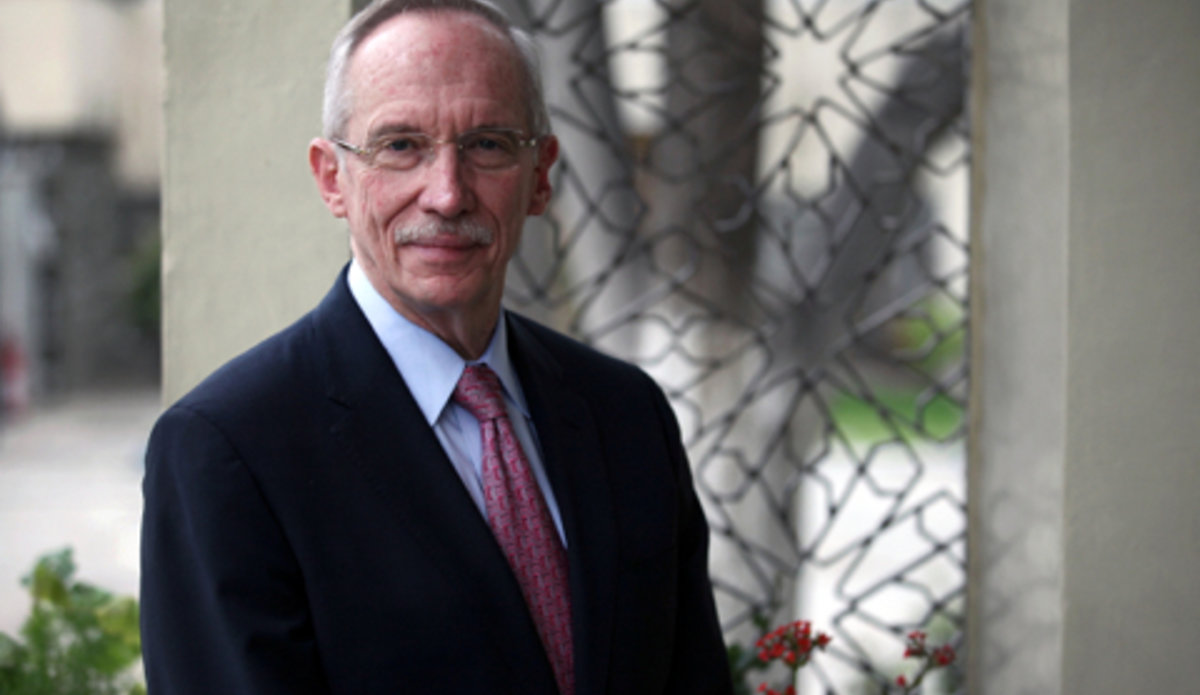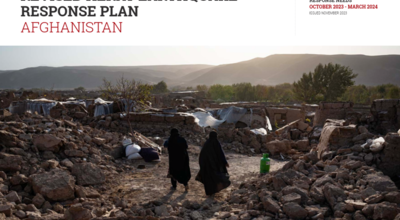Credible Afghan polls will open door of continued international support – Edmond Mulet
KABUL - Edmond Mulet, the United Nations Assistant Secretary-General for Peacekeeping Operations, visited Afghanistan earlier this week, from 20 to 24 April. As the operations manager of the UN Department of Peacekeeping Operations, Mr. Mulet has responsibility for UN’s 14 peacekeeping missions around the world as well as the UN Assistance Mission in Afghanistan (UNAMA), which is the world body's only special political mission.
At the end of his visit to Afghanistan, his first to the South Asian nation, the Guatemalan said in an interview that despite emerging global hotspots needing attention of the international community, Afghanistan still needs international support and the world body will continue rallying that support needed for Afghanistan to move forward.
Stressing that Afghanistan is “still extremely important” for the UN, Mr. Mulet added that the international community should build on the progress Afghanistan has made over the past decade and the UN will continue to motivate the international community and donors to continue engaging with the country, and to remind its 193 Member States that “the job has not been completed [in Afghanistan].”
Below is near-verbatim transcript of the interview.
UNAMA: What were your objectives of coming to Afghanistan and how did it go overall?
Edmond Mulet: I had never been to Afghanistan before and UNAMA is such an important mission, especially now with so many transitions going on the security track, on the political track, on the economic track. So I thought it would be important to come to UNAMA now and exchange views with the leadership of the mission and also with our counterparts, our friends in the Afghan Government and other partners of the international community – all this related to the future role of the United Nations in Afghanistan.
If we take a picture of this country today, we can see it very bleak. The human rights situation, the security situation, the institutions are very weak. The issues of impunity, corruption, human rights and human development indices are really very, very low. But, if you compare the picture today of Afghanistan with the picture of five years ago or 10 years ago, we can see there has been an enormous evolution in many areas – education, gender issues, human rights, local tracks. So, I think we should not concentrate only on looking at the current picture of Afghanistan, which as I said, could be very depressing. But we really have to see where Afghanistan is coming from. We have to build on that. This is a moment for the international community and certainly for the United Nations to renew its commitment and its engagement in Afghanistan and to continue working with the Afghan people and to see not the situation of Afghanistan today and where it came from, but looking certainly into the future.
I believe that the potential for the country, for its development and moving forward is there. Of course, it is not going to be easy, with many challenges, many risks along the way. But, I am also certain that the international community has invested so much money, so many resources, so many lives in Afghanistan. The international community will not abandon Afghanistan and that this engagement will continue here until the Afghan people will not need that international presence or assistance or cooperation any more. We will see a UN presence in Afghanistan for some time assisting and helping on the political track, on the security track and on the economic track which, I believe, is also important.
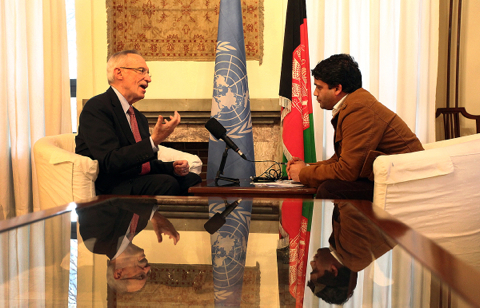
I think that these four days in Kabul have been extremely productive and effective and have helped me understand better the circumstances of the country and the way the mission [UNAMA] works. I think there is an opportunity here for the United Nations to continue working in Afghanistan. My presence here is also to build on the visit that the Deputy Secretary-General, Jan Eliasson, will be making to Afghanistan at the end of June and also to give assurances to the Afghan people that we are here, we have been here before and we will continue to be here in order to help and assist Afghanistan.
UNAMA: You mentioned about enormous evolutions in last five to 10 years in Afghanistan. But, how do you see the future of Afghanistan five or six years down the line?
Edmond Mulet: I think that the role of the UN is also to motivate the international community, donors, countries that are willing to contribute to Afghanistan to continue with their engagement, to remind the Member States that the job has not been completed. We have not attained yet all the goals that we jointly wanted to attain, that we really need to continue to be in Afghanistan. The UN has a political role in rallying the international community in support of Afghanistan, especially now when there is this international financial crisis that is limiting resources. At this time, there are other hotspots around the world that also forces the international community to pay attention to these other places and to also provide financial and economic assistance to these other places. But I think this should not be done at the expense of Afghanistan, not at the expense of what has been already attained in Afghanistan.
So, I think the role of the UN at this juncture is also to remind everybody that responsibility towards Afghanistan, and that we need to continue to build on what has been attained before. If we do not do that, if we do not continue with that engagement and that support in Afghanistan, we might see some setbacks – on economic, on development, on political and security tracks. So much has been already invested in Afghanistan and it will be really pity to forget what has been attained by now. On economic development, on health issue, on human rights issue, on gender issue and education, a lot has been attained. Of course, Afghanistan’s development indices are still the lowest in the world. So much more has to be done. But the seeds are there. It is already sprouting and flowering. I think we really have to push a little bit more and we will see results here.
UNAMA: How do you see preparations for the elections, peace and reconciliation process and transition process going? Do you have concerns?
Edmond Mulet: We all have concerns on the local tracks, but everything is tied up together.
But I do believe and the United Nations believes that the elections are really going to determine the level of engagement of the international community in Afghanistan in the future. If these elections are conducted in a proper way, in a transparent way, if these elections are credible and are accepted by the majority Afghans as being a legitimate process, that will certainly open the door and the windows of international community’s continued engagement in Afghanistan. The international community will be motivated to be in Afghanistan.
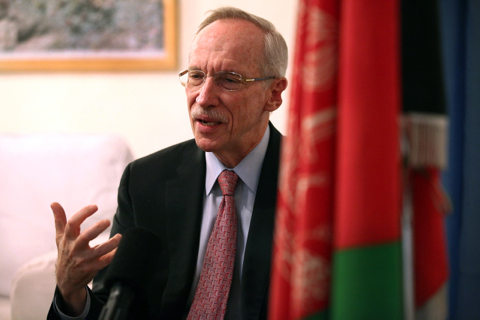
But, for example, if these elections were not to be credible or if there was fraud or there was manipulation that the results were not recognized as acceptable, then you would see certainly from the donor community, international community, they won’t be really interested or motivated to continue assisting Afghanistan the same way as they did before.
I do see the elections as a marker that will really determine that level of engagement. Of course, we have been receiving assurances from the afghan leaders, local parties, civil society, everybody. They would like to see good elections. I can see that they want to do things the right way, which is already a good sign and a good guarantee and we can see [that] in parliament. They are really moving forward with the electoral law and very important discussions are happening there at the parliament level. The Independent Election Commission (IEC) has been also working hard on the logistics, security, administrative issues related to elections and parties are getting ready to participate in these presidential elections and in 2015 regional legislative elections which are also important. So, the momentum is very much there. It is going to be an important step. The way these elections are conducted will determine the interest of the international community to continue working and supporting the efforts of the Afghan people.
UNAMA: In Afghanistan, there is a high level of expectation of the United Nations and the international community. On the other hand, there are other global hotspots for the international community to pay attention to. How prominently does Afghanistan feature in a broader context?
Edmond Mulet: Afghanistan is still extremely important – probably not as urgent as it used to be. It was very urgent at some point. Many good inroads have been done, performed during these last years. So the sense of urgency is probably not there anymore. But the sense of importance is still there. This is also the role of the UN to coordinate, to work with the international community to keep this interest alive and to remind everybody that Afghanistan is very important for everybody, mostly for the Afghans themselves. For them, the success of this process is very important.
At the regional level also, the stability and peace in Afghanistan is important for all the neighbouring countries, for the entire region and the whole continent and for many countries beyond the geographical proximity. I think it is in the interest of everybody that this Afghan process is a successful one. I think we will get there.
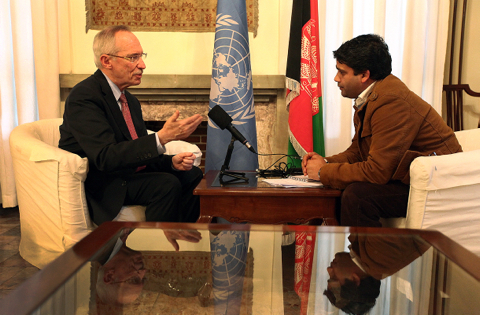
UNAMA: There are high expectations of the UN here, and the UN has also been saying it will stay here to support the people. At the same time, the international community is scaling down their operations here. How do you see the UN’s role post-2014?
Edmond Mulet: It depends very much on the conversations that we will be having with the [Afghan] leadership, with the Afghan people, because we will not be in a country unless leadership of the country accepts and asks for that presence. So, Afghanistan will define the role of the UN’s presence here and the UN will be here to work on your [Afghanistan’s] priorities. Afghanistan will identify those priorities and we will be working with you in those different areas. [In all our conversations with the Afghans at various levels], there is a unanimous vision that the UN is welcomed in Afghanistan and that the UN has an important role to play here in some of the tracks that I mentioned. For example: on human rights, this is something that is a part of the core of our responsibilities.
The UN would be willing, for example, to support the internal national dialogue and reconciliation, if requested, also on elections, good offices, technical support on institutional building in many ways. The UN Country Team, funds, programmes, agencies have been in Afghanistan for almost 60 years and will continue to be here working on all different array of areas and responsibilities. They have been doing that in a very, very effective way providing humanitarian assistance, feeding people, [carrying out] vaccination programmes, education programmes, cultural heritage protection programmes, rule of law – many, many areas we have been involved. Those priorities will be really defined by the Afghans themselves and we will be providing that kind of support.
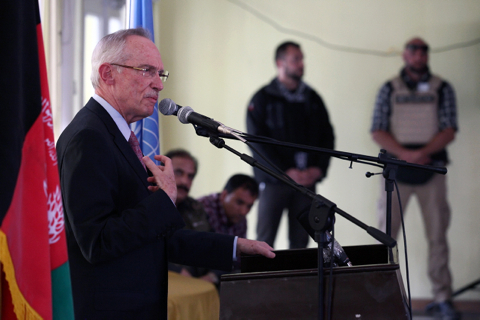
UNAMA: What message are you taking from here?
Edmond Mulet: The first one would be that it is really worth being involved in Afghanistan and to continue to work in Afghanistan and to be engaged in Afghanistan even though the picture of today is dire. As I said, so many good things have been accomplished over the last 10 years that we really have to build on that. My first conclusion, recommendation would be ‘carry on, let’s go, let’s continue with that engagement, with that involvement. Let’s motivate all the international community not to forget, not to abandon Afghanistan, especially now. So much has been achieved and really we have to continue.’
The second one would be that we have to recognize that it is not going to be easy. There are many risks and challenges and that we have to be ready to confront those risks and challenges. You know this international financial crisis and many expectations regarding the UN role in Afghanistan. But then on the other hand, Member States have been cutting down our budget and asking us to reduce and reduce and reduce. The idea now is to really work with the Member States and tell them ‘look, this is what the UN can do at the request of the Afghan people and then we the international community need to support the UN in the work we have to do here in Afghanistan. It is worth it. It is very difficult. This is a very special moment for Afghanistan for the international community to really produce something that is visible, that’s tangible, and that will benefit so many institutions, people and organizations and principles around the world.
UNAMA: There have been very firm commitments from the international community on Afghanistan. At the same time, they have also expected commitments from the Afghan side. Do you see that level of commitment on the Afghan side to deliver?
Edmond Mulet: Yes, I do and we have seen that. One of those of course is going to be a credible and good election. That will determine the level of commitment and engagement of the international community in the future. On the security track, the way the Afghan security forces have been beefing up and building its own capacity and assuming responsibilities. Most of the fighting right now is being done by the Afghans, not done by ISAF [International Security Assistance Force] members any more. Afghan forces are on the forefront. The government is assuming more and more responsibilities all the time. So, this compact, this agreement [is about] these common responsibilities from the Afghan Government and the international community. I think they are producing results.
Of course, nothing is perfect. There is always room for improvement. But the good thing is that there is permanent dialogue, and contacts in a frank and open way, which is really fantastic. In many other places and the countries around the world, we do not find that level of mutual respect and collaboration as we find in Afghanistan.
Thank you.
 UN
UN
